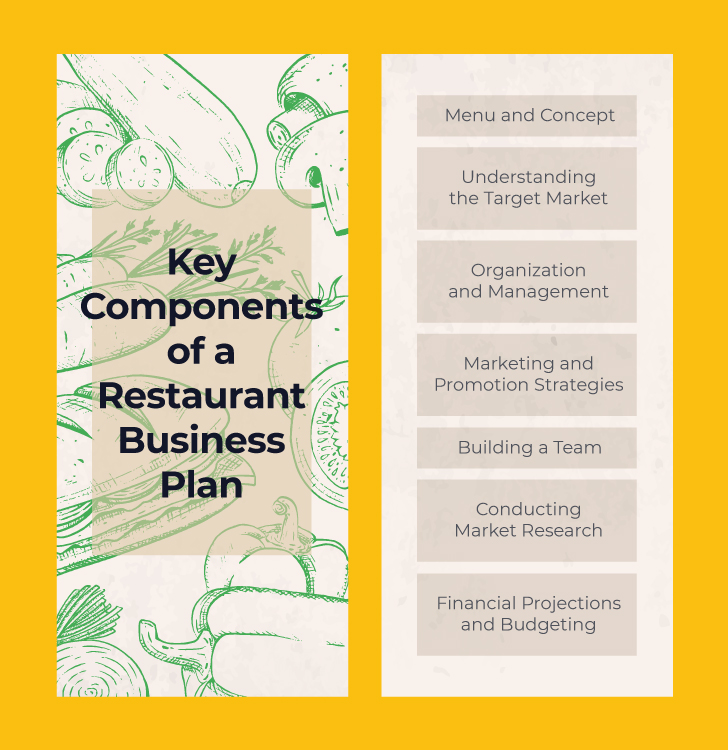The Importance of a Business Plan for Restaurant – Cooking Up Success in 2023
[read_meter]
Starting a restaurant can be an exciting venture, but it often requires significant financial investment. To secure the necessary funds, it is crucial to develop a well-structured business plan for restaurant that not only outlines your restaurant’s concept, menu, and marketing strategies but also appeals to potential investors. This article will guide you through the process of creating a business plan for restaurant that can help you find investors for your restaurant.
The Importance of a Business Plan for a Restaurant
A well-crafted business plan is crucial for several reasons. Firstly, it serves as a tool to attract potential investors or secure funding from financial institutions. A comprehensive plan demonstrates professionalism, expertise, and a clear vision, increasing the chances of obtaining financial support. Additionally, a business plan helps the restaurant owner identify potential challenges, develop contingency plans, and make informed decisions.
Overview of the Restaurant Industry
Before diving into the specifics of a restaurant business plan details, it’s essential to understand the restaurant industry as a whole. The restaurant industry is a dynamic and competitive sector, encompassing a wide range of establishments, from fine-dining restaurants to fast-food chains. Understanding industry trends, customer preferences, and market demands is crucial for crafting a successful business plan.
Crafting an Investor-Friendly Business Plan for a Restaurant
When creating your business plan for restaurant, keep in mind that it should be investor friendly. Start with a compelling executive summary that highlights the unique aspects of your restaurant and its growth marketing potential. Include an overview of the market, competitive analysis, and your target audience. Clearly outline your revenue streams, marketing strategies, and financial projections. Use visual aids, such as charts and graphs, to make the information more digestible and engaging.
Are you looking to secure funding for your restaurant business? At Easy Capraise, we specialize in connecting businesses like yours with potential investors. Our experienced team understands the unique challenges of the industry and can help you navigate the fundraising process successfully.
Key Components of a Restaurant Business Plan
A well-structured restaurant business plan consists of several key components that provide a comprehensive overview of the venture. These components include:

Menu and Concept
The menu and concept section outlines the cuisine, theme, and dining experience offered by the restaurant. It should showcase the unique aspects of the menu, the sourcing of ingredients, and the overall dining atmosphere.
Organization and Management
This section highlights the organizational structure of the restaurant and the key members of the management team. It should outline the responsibilities and qualifications of each team member and their contributions to the success of the restaurant.
Understanding the Target Market
When creating a business plan for restaurant, it is crucial to understand your target market. Research the demographics, preferences, and dining habits of your potential customers. Analyze the competition and identify gaps in the market that your restaurant can fill. This information will help you tailor your business plan to meet the needs of your target market.
Marketing and Promotion Strategies
Outline your marketing and promotion strategies in your business plan for restaurant. Identify the channels you will use to reach your target markets, such as social media, online advertising, and local partnerships. Develop a strong branding strategy that resonates with your target audience. Include a detailed marketing budget and timeline to demonstrate your commitment to attracting customers.
Building a Team
Describe the key roles and responsibilities in your restaurant and the skills required for each position. Explain how you will recruit, train, and retain qualified staff members. Investors want to see that you have a strong team in place to execute your business plan for restaurant successfully.
Conducting Market Research
Thorough market research is essential to validate your business concept and identify potential opportunities and challenges. Gather data on market trends, customer preferences, and industry forecasts. Analyze the market saturation and identify gaps that your restaurant can capitalize on. Use this information to refine your business plan and make informed decisions.
Financial Projections and Budgeting
Develop realistic financial projections for your restaurant, including revenue, expenses, and profitability. Consider factors such as food and beverage costs, staff salaries, rent, utilities, and marketing expenses. Create a budget that covers startup costs, ongoing expenses, and contingencies. Investors will be interested in the potential return on their investment, so ensure your financial projections are well-researched and based on accurate data.
Implementing the Business Plan for Restaurant
With the funds secured, it’s time to put your business plan into action. Follow the strategies outlined in your plan to launch and operate your restaurant successfully. Monitor your progress regularly and make adjustments as needed. Stay focused on providing exceptional customer experiences, maintaining quality standards, and adapting to market trends.
FAQs
What is an example of a business plan for restaurant?
An example of a business plan for a restaurant can include sections such as an executive summary, market analysis, concept and vision, menu and cuisine selection, target market and competitive analysis, marketing and advertising strategies, operational plan, staffing and management, financial plan, and risk assessment. Each section provides detailed information about different aspects of the restaurant’s business operations and goals.
How can I write a business plan for restaurant?
To write a small business plan for a restaurant, start by outlining the executive summary, which briefly describes your concept, target market, and financial projections. Conduct a market analysis to understand the local trends, demographics, and competition. Define your restaurant’s concept and vision, and select a menu and cuisine that aligns with your target market. Develop marketing and advertising strategies, outline operational plans, and define staffing and management requirements. Finally, create a financial plan and assess potential risks.
How do I write a business plan for a fast-food restaurant?
Writing a business plan for a fast food restaurant requires careful planning and attention to detail. Here are some essential steps to guide you:
Executive Summary: Start with a compelling overview of your fast-food restaurant concept, mission statement, and the unique value you offer to customers. Highlight your experience and expertise in the industry.
Company Description: Provide a detailed description of your fast-food restaurant, including its legal structure, location, target market, and competitive advantages. Explain the type of fast-food cuisine you will offer and any unique selling points.
Market Analysis: Conduct thorough research on the fast-food industry, including market trends, customer preferences, and potential competitors. Identify your target market and analyze their demographics, eating habits, and spending patterns. Use this information to develop effective marketing and sales strategies.
Menu and Pricing: Outline your fast-food menu, including a variety of dishes and options. Consider factors such as nutritional value, affordability, and potential for customization. Determine pricing strategies that align with your target market and maintain profitability.
Marketing and Sales: Develop a comprehensive marketing and sales plan to attract customers to your fast-food restaurant. Define your brand positioning, target audience, and marketing channels such as social media, online advertising, and local promotions. Include strategies for customer retention and loyalty programs.
Operations: Explain how your fast-food restaurant will operate on a daily basis. Outline the layout of the restaurant, equipment and technology needed, staffing requirements, and standard operating procedures. Address food safety and hygiene practices and any necessary permits or licenses.
Management and Organization: Describe the structure of your management team and key personnel, highlighting their relevant experience in the fast-food industry. Define their roles and responsibilities and outline a plan for staff training and development.
Financial Projections: Present detailed financial projections, including startup costs, monthly expenses, revenue forecasts, and profit margins. Include a break-even analysis and cash flow projections. Demonstrate a clear understanding of the financial viability of your fast-food restaurant.
Funding Request: If you require funding for your fast-food restaurant, clearly state the amount you need and how you plan to utilize the funds. Explain the potential return on investment for investors or lenders and outline any collateral or security you can offer.
Appendix: Include any supporting documents, such as market research data, menu samples, licenses, permits, or resumes of key team members.
Remember to tailor your small business plan for restaurant to the specific needs and goals of your fast-food restaurant. It should be well-organized, concise, and compelling. Regularly review and update your plan as your business evolves and new opportunities arise.
Conclusion
Developing a business plan for a restaurant that attracts investors requires careful planning, market research, and financial projections. By understanding your target market, defining your concept, and presenting a compelling plan, you can increase your chances of finding investors who believe in your vision. Remember to approach the process with professionalism, be prepared to negotiate, and finalize investment agreements that benefit all parties involved. With a well-executed business plan and the support of investors, your restaurant can thrive in a competitive industry.
Contact us
Good to have you here! If you have any queries, please leave your message. Our team will reach out soon:)
.








